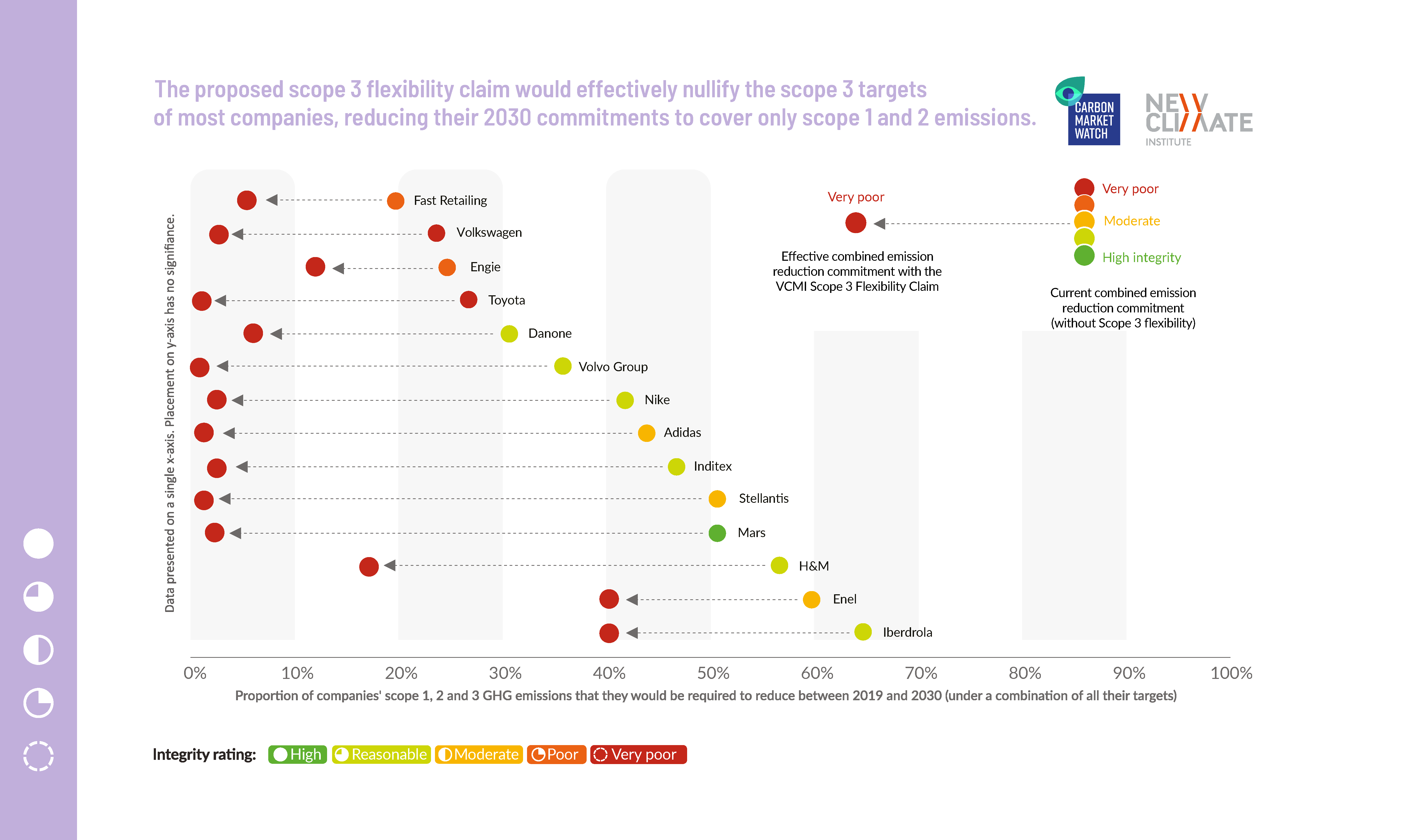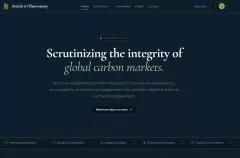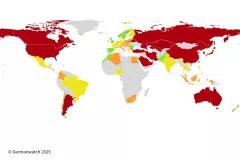NewClimate Institute applauds the brave reaction from the staff of the Science Based Targets initiative, who today issued a strong statement rejecting their Board’s unilateral statement on the use of carbon credits.
The SBTi Board of Trustees released a statement on 9 April 2024, suggesting that SBTi has decided to allow the use of carbon credits toward companies’ scope 3 reduction targets, which cover up- and downstream emissions. This statement comes somewhat out of the blue, and it prematurely bypasses the technical process in which SBTi staff are currently systematically assessing the evidence base for the effectiveness of carbon credits and other environmental attribution certificates.
The Board’s statement also directly contradicts the recommendation by the United Nations’ High-Level Expert Group on the Net-Zero Emissions Commitments of Non-State Entities that carbon credits “cannot be counted toward a non-state actor’s interim emissions reductions”.
Analysis from the 2024 Corporate Climate Responsibility Monitor, also published 9 April, shows that the use of offsetting mechanisms for scope 3 targets could completely nullify the already insufficient climate commitments of most companies.
If companies are allowed to achieve their scope 3 targets through offsets, they have little incentive to align their business model with the Paris Agreement’s 1.5°C temperature limit. Instead, companies would get a carte blanche to continue business-as-usual for another decade and take no responsibility for reducing the large majority of their emissions. As companies’ supply chains are mostly located in the Global South, introducing offsetting to achieve scope 3 targets, would also deprive suppliers from much needed financial and technical decarbonisation support.
The proposed flexibility to offset scope 3 emissions is a blunt mechanism which is not the right solution to address the challenges that companies understandably face in implementing their targets. Instead, this year’s GHG Protocol and SBTi Net Zero Standard revision processes are an opportunity to reconsider the categorisation of value chain emissions and scope 3 target-setting approaches to focus on the most critical decarbonisation indicators for each sector well within companies’ direct control.
Most importantly, we believe that the Science Based Targets initiative should be built on a reliable governance structure that allows for the independent, transparent, and science-aligned development of standards. Only then can the SBTi drive real corporate climate ambition forward. We applaud the SBTi staff for their resolve to deliver this and to push back on the Board’s actions.
Perspectives from NewClimate Institute experts on the recent developments
Thomas Day, one of the lead authors of the Corporate Climate Responsibility Monitor, says: “More than just buckling under pressure, the SBTi Board’s statement looks like an illegitimate takeover. We understand that the SBTi Board of Trustees have taken a unilateral decision with no scientific basis, and no backing from SBTi's own technical council and standards development team. They have been bypassed in the process. The offsetting mechanism being forced on SBTi would completely nullify the already insufficient scope 3 commitments of most companies, reversing years of incremental progress that SBTi and its member companies have fought so hard to achieve. What we need is reliable governance and science-aligned development of standards. We applaud the SBTi staff for their resolve to deliver this and pushback on the Board’s actions.”
Frauke Roeser, who has been working on the nexus of climate action and sustainable development for over two decades, comments: “The offsetting mechanism is guised as a source of climate finance to support emerging societies and communities to develop sustainably. This is at best misleading. Communities across the globe need substantive support to implement climate action on the ground and enable sustainable development. Foremost, they need our economies and supply chains to fundamentally transform to avoid the most disastrous impacts of climate change. This is not achieved by delaying real corporate action through financial transfers into comparatively easy, “low-hanging” emission reductions in the Global South.”
Juliette de Grandpré, who is a member of the SBTi Technical Advisory Group, says: “The courageous statement by the Science Based Targets initiative’s staff unambiguously shows that the initiative finds itself at a decisive crossroads going forward. Reversing the non-scientific decision by the Board of Trustees and implementing a robust and trustworthy governance system will allow it to regain its lost reputation and focus on developing science-aligned standards. Ignoring these will simply make it just another initiative driven by vested interests. We simply cannot afford the latter given just six years left in this crucial decade for climate change.”
Dr. Takeshi Kuramochi, who is a member of the SBTi Scientific Advisory Group, says: “Through their statement the SBTi board of trustees basically dumped ‘science’ into trash bin in the interest of corporates. While I’m utterly dismayed about this awful breach of trust and governance, I’m also encouraged by the strong resistance and reaction taken by the SBTi staff members.”
Carsten Warnecke, who has been involved in the development of the SBTi Net Zero Standard, comments on the developments as follows: “Anyone who still believed that the voice of science still had weight in this initiative has been proven wrong. Despite the good intentions of many individuals, inside and from outside SBTi, the real decision-making power was obviously transferred to more powerful actors in the background. When staff is not able to turn back the wheel, it will be time to relabel the initiative to what it actually became over a time: a business-driven initiative. We should at least stop arguing that this represent or is based on science or backed by the UN.”
Sybrig Smit, one of the co-authors of the Corporate Climate Responsibility Monitor, says: "There are billions on the line. The faulty business model of offset credits is in danger and this wild move is an attempt to keep the business model alive. It's not an attempt to save the climate. On the contrary, it will allow businesses to continue exploiting the planet's resources, and continue unsustainable and harmful supply chains, which mainly take place in the most vulnerable parts of the world"
Prof. Niklas Höhne, who has extensively researched corporate and national-level climate action for over two decades, says: “Record temperatures show that we have no time to lose in climate action. We are so late in reducing global emissions that nobody has anything to sell. It is grossly misleading to allow companies to claim to be on a 1.5°C pathway while not reducing their own emissions but using reductions from elsewhere, which should happen anyway. The fight over the multi-billion-dollar voluntary carbon market is on and it is fought by some not based on science.”
Hanna Fekete, having followed the creation of the Paris Agreement and its implementation since 2015, comments: “The recent developments are deeply concerning and undermine the Paris Agreement. We need profound sector transformations across the globe, and a fair approach to enabling those transformations in developing countries. Giving businesses a free ride to offset their carbon footprint leads to the opposite: It decreases pressure on businesses to decarbonise and only exploits the cheapest mitigation options in developing countries.”






